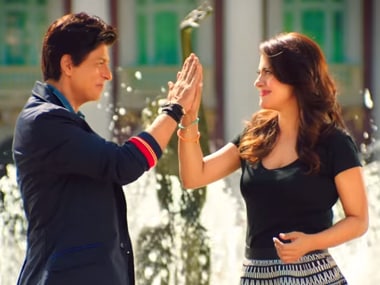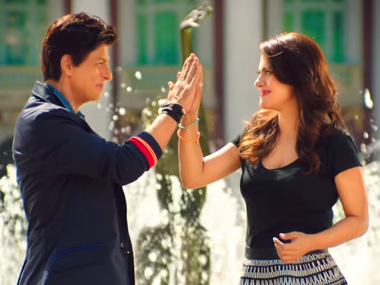The Shahrukh Khan and Kajol starrer Dilwale prompts just one question: How bad can a bad film be? If you have seen enough mainstream Bollywood films, you would know that a bad movie comes in various forms — entertainingly bad, infuriatingly bad, insultingly bad — but this movie doesn’t fit into any of those slots, at least not completely. Dilwale makes you wonder something else; can a film be deliberately bad? Did a filmmaker like Rohit Shetty, known for making exceedingly mediocre productions that go on to break box office records, really play a cruel joke on his audiences, willfully dish out a terrible movie to them to test their taste, to check if he’s actually bigger than them? That is, of course, an unlikely scenario but, even then, something needs to justify a film that’s inept at every conceivable level — one completely bereft of craft, thought, and joy. [caption id=“attachment_2551458” align=“alignleft” width=“380”]  A still from Dilwale. Image from Youtube.[/caption] Shetty is known, and has been handsomely rewarded, for making brain-dead films in the past, and there’s nothing innately wrong with that. There is, and should be, a space for that kind of cinema, where common sense and logic are sacrificed in favour of some genuine, albeit momentary, laughs. In fact, Shetty’s films such as Golmaal, All the Best: Fun Begins, Indra Kumar’s Dhamaal, and Sajid-Farhad’s Entertainment (also dialogue writers of Dilwale) are perfectly fine examples of some films in recent years that were fairly enjoyable, because they were completely committed to their silliness — ones that didn’t take the easy route just because they were inherently frivolous. But Dilwale wants to appear different. It wants to be weighty and silly — a feat that’s much difficult to achieve than it seems — it wants to revel in its one-liners, but also wants to wallow in the sting of heartbreak; it wants to talk about youthful innocence but without losing sight of cynicism that comes with age, and it wants to accommodate all of this within the template of a mainstream Hindi movie, which must also include romantic songs, chase sequences, and a parallel comedic track. But here’s the most glaring and infuriating bit about Dilwale: it’s not honest or assiduous about any of the aforementioned attempts. As one insipid scene moves on to the next, you are forced to wonder about the inanity of this excuse of a film. Dilwale, however, wasn’t a tough film to salvage, and wouldn’t have been this unbearable, if Shetty had the basic skills to execute its most crowd pleasing bit — the chemistry between Khan and Kajol — superficially well. He definitely had the set up: both of them were conventionally romancing each other on screen after Kabhi Khushi Kabhie Gham, which came 14 years ago (and though they were paired opposite each other in My Name is Khan, Kajol and Khan, playing a man afflicted with Asperger’s Syndrome, didn’t share a routine romantic relationship in the movie) and are known for sharing a chemistry that can make even the schmaltziest of set ups believable and enjoyable. But Shetty’s not a Karan Johar or Aditya Chopra; he doesn’t know what made Khan and Kajol complement each other so well in the 90s. Shetty can do beefy gun-toting cops; he can do fringe characters mouthing inanities, but even with all his supposed understanding of what the Indian audience wants, he can’t do romance, he can’t even begin to understand one of its favourite pairs. He does throw everything at the wall, though: Kaali (Khan) tries to woo Meera (Kajal) via a “five minute date” (obviously no explanation is given why she can only spare him such a short duration); he romances her in locales of Iceland, amid waterfalls, rainbows, and mountains, in the Gerua song; he, towards the film’s end, holds and asks her to look into his eyes. When Kaali and Meera meet each other after 15 years, the scene looks as artificial as the raindrops bathing them. These moments could have been of some value, if not for anything else then just for nostalgia’s sake, but they mean zilch here, seen as they are from the eyes of a businessman, rather than a director, who knows a hit formula but is clueless about what makes it one. Khan seems disinterested and unconvincing throughout the movie (even his famous calculated charm is conspicuous by its absence here), but, quite surprisingly, so is Kajol, who’s often brought much humour and credibility to mediocre movies like these in the past. If Khan and Kajol are shoddy, then the rest of the cast isn’t any better. Varun Dhawan, playing Khan’s younger brother in the movie, who turned in decent performances in Humpty Sharma Ki Dulhania and Badlapur, is out of depths here, botching both his dramatic and comedic scenes. Kriti Sanon, Dhawan’s love interest, is immensely and instantly forgettable in a weakly written part. But these aren’t the only grating parts of this film, which includes a rape joke and orchestrates situations to blame its women characters. Ultimately, it’s Sanjay Mishra, playing a seller of stolen goods, who makes this movie even slightly tolerable, talking with a Dev Anand-like twang and speaking such monumentally absurd lines that you can only admire his conviction. Sample a few of them: “Paanch minute wait be, hoga on the way, McDonalds and Subway”; “jaisa behta hai ATM se paisa, tu kaise kar leta hai kaam aisa?”; “bahut kaam hai, total Haldiram hai.” Unlike others, Mishra’s not even pretending to act here, something that makes his performance endurable, at times even bizarrely enjoyable. But, let’s be honest, no one will walk into Dilwale for Sanjay Mishra; people will look for Khan, Kajol, Khan and Kajol, perhaps even Shetty. And in return they will once again receive a rap on the knuckles for wholeheartedly investing in mainstream Hindi cinema.
The Shahrukh Khan and Kajol starrer Dilwale prompts just one question: How bad can a bad film be?
Advertisement
End of Article


)
)
)
)
)
)
)
)
)



